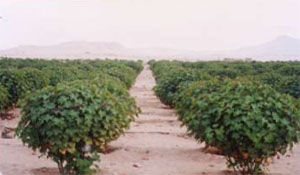Tina Sampay (talk | contribs) No edit summary |
Tina Sampay (talk | contribs) No edit summary |
||
| Line 2: | Line 2: | ||
<!-- These comments are offered as an aid as you get started. Remove as you wish. --> | <!-- These comments are offered as an aid as you get started. Remove as you wish. --> | ||
<!-- next line is the code for inserting an image; delete if you don't have an image yet --> | <!-- next line is the code for inserting an image; delete if you don't have an image yet --> | ||
[[File: | [[File:Foreest.jpg|thumb|right|Jatropha forest that produces Biodiesel oil in Luxor.]] | ||
| Line 27: | Line 27: | ||
== Overview == | == Overview == | ||
Jatropha planting and the overall afforestation in Luxor (Upper Egypt)has done considerably better than similar projects in other countries for a number of many different reasons. It has a increased rate of growth and productivity. Shrubs produce seeds after 18 months of planting seedlings compared with 3 years in other countries | Jatropha planting and the overall afforestation in Luxor(Upper Egypt)has done considerably better than similar projects in other countries for a number of many different reasons. It has a increased rate of growth and productivity. Shrubs produce seeds after 18 months of planting seedlings compared with 3 years in other countries. | ||
== References == | == References == | ||
| Line 44: | Line 34: | ||
http://www.eeaa.gov.eg/english/main/env_forests_jatropha.asp | http://www.eeaa.gov.eg/english/main/env_forests_jatropha.asp | ||
http://www.worldresourcesforum.org/files/WRF2013/Workshops/Jan%20Benjamin%20Eger.pdf | |||
<references/> | <references/> | ||
[[Category:JMC330 International Mass Communication]] | |||
[[Category: | |||
Revision as of 22:00, 4 April 2014

Afforestation
Afforestation is the action of planting a forest where there were previously no forest stood. The targeted land was once formally used for purposes other than forestry. The successful treatment of sewage water leads to afforestation and the planting of Jatropha. Afforestation in Egypt has a multi-functional approach. In Egypt, it's established plantations can be of considerable economical, ecological, and social importance.
Planting Jatropha in Egypt
Initially, through "The national Programme for treated sewage water for Afforestation," a pilot project was directed on a large portion of the country to determine whether or not the act of afforestation, using basic-treated sewage water, would be successful or not. The afforestation includes a number of different species; including Jatropha and Jojoba. Which are planted and used as bio fuel crops. Thus, the successful planting of these plants through the pilot project has illustrated that sewage water can be used for the formation of new forest in desert lands. The programme also demonstrated the high potential for afforestation of species that could be used for multiple purposes of socio-economic importance.
Objectives
- Using water resources efficiently.
- Decreasing pollution through the growth of planted trees.
- Renewable energy sources through wood & biofuel.
- Food security for the population through combating desertification
- Erosion & Sand Dune protection
Costs
The Egyptian Government has used a considerable amount of funds on the development of the infrastructure necessary for the safe use of treated sewage water for afforestation. The government is now developing ways to include the involvement of national and international organizations in order to encourage investment activities.
Overview
Jatropha planting and the overall afforestation in Luxor(Upper Egypt)has done considerably better than similar projects in other countries for a number of many different reasons. It has a increased rate of growth and productivity. Shrubs produce seeds after 18 months of planting seedlings compared with 3 years in other countries.
References
http://sc-ope.com/daad/wp-content/uploads/2013/06/Project-description-1-Information-Summary.pdf
http://www.eeaa.gov.eg/english/main/env_forests_jatropha.asp
http://www.worldresourcesforum.org/files/WRF2013/Workshops/Jan%20Benjamin%20Eger.pdf